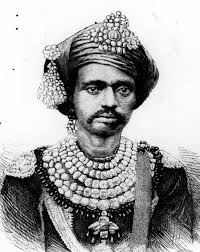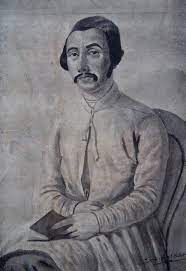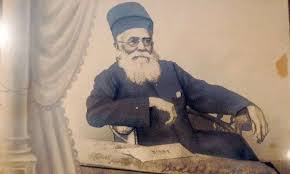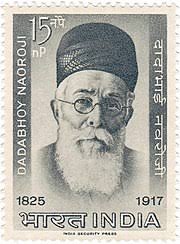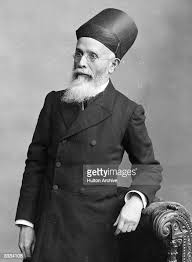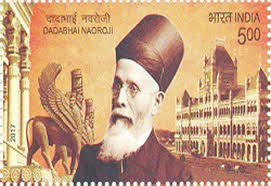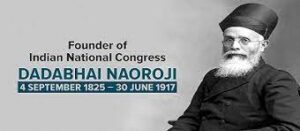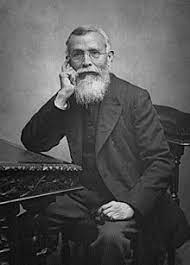Dadabhai Naoroji (1825 or 1839 – 1917) was an Indian political leader, educator, and social reformer, often referred to as the “Grand Old Man of India.” He played a significant role in the Indian National Congress and the early Indian independence movement against British colonial rule.
Naoroji was born in Bombay (now Mumbai), India. As the first Indian elected to the British Parliament, he received his education both in India and England. Serving as a Liberal Party Member of Parliament (MP) for Central Finsbury in 1892. During his time in the British Parliament, he advocated for the rights and interests of Indians living under British rule.
He is most known for his economic theories and analysis on the economic exploitation of India by British colonial forces. The “Drain of Wealth,” a term coined by Naoroji to describe the British colonial government’s economic exploitation of India. What made him renowned was his role in siphoning the country’s wealth to Britain while leaving the Indian economy impoverished.
Naoroji was also a staunch supporter of education and social reform. He believed that education was crucial for the progress of the Indian population and advocated for its improvement. He advocated for Indians’ social and political rights and strove to develop national pride and solidarity.
His contributions to the Indian National Congress were instrumental in shaping the early stages of the Indian independence movement. He aimed to create awareness about the oppressive colonial policies and encourage Indians to strive for self-governance.
Dadabhai Naoroji was a pathfinder in drawing attention to the political and economic issues that India was facing under British control, which makes his legacy important. His contributions prepared the way for other leaders and movements that resulted in India’s 1947 independence.
Dadabhai Naoroji Early Life:
Dadabhai Naoroji, born on September 4, 1825, in Mumbai, India, was a prominent Indian political and social leader during the late 19th and early 20th centuries. He had a strong early dedication to social reform and education. Naoroji was born into a Parsi family and struggled financially after his father died unexpectedly. However, his determination and academic prowess led him to secure a scholarship to Elphinstone College in Bombay (now Mumbai). He excelled in his studies, especially in mathematics and natural sciences.
After completing his education, Dadabhai Naoroji embarked on a teaching career, becoming a professor at Elphinstone College. He entered public life actively because of his love of social concerns and his care for the wellbeing of Indians. The socioeconomic realities that prevailed in India during British colonial authority had a profound impact on Naoroji. And, he dedicated himself to addressing the challenges faced by his countrymen.
As he delved into politics, Dadabhai Naoroji became an advocate for Indian self-rule and tirelessly worked towards creating awareness about the economic exploitation faced by India under British colonialism. His early years set the stage for a lifelong commitment to public service, education, and advocacy for India’s independence, making him one of the key figures in the Indian nationalist movement.
Dadabhai Naoroji Education:
Dadabhai Naoroji, a prominent figure in Indian history, was born on September 4, 1825, in Bombay (now Mumbai). Known as the “Grand Old Man of India,” he was an important figure in the Indian National Congress and the country’s independence movement.
In terms of education, Dadabhai Naoroji had a diverse and impressive academic background. He started his education at Elphinstone College in Bombay, where he displayed exceptional intelligence and academic prowess. His early education laid the foundation for his later achievements in the field of economics and politics.
Naoroji’s quest for knowledge led him to England, where he continued his education. He became the first Indian student admitted to University College London when he enrolled there. In 1855, he earned a degree in mathematics and natural philosophy, showcasing his intellectual capabilities and commitment to education.
Following his academic success, Dadabhai Naoroji embarked on a career that blended his expertise in economics with his passion for social and political reform. He became a professor of mathematics and natural philosophy at Elphinstone College, contributing to the education of future generations.
Naoroji’s educational background was instrumental in shaping his views on economic and social issues facing India. His dedication to public service and his intellectual prowess set the stage for his eventual rise to prominence in politics. Dadabhai Naoroji was a lifelong supporter for education as a driver of social progress and national development in India.
Dadabhai Naoroji Business:
Known as the “Grand Old Man of India,” Dadabhai Naoroji (1825–1917) was an Indian political figure, philosopher, and social reformer. Though his efforts to the Indian independence movement and his status as one of the Indian National Congress’s founding members are what made him most famous. Naoroji also had a notable impact on the economic discourse of his time.
In the business context, Naoroji made significant contributions to economic thought, particularly through his work on the economic exploitation of India by the British colonial administration. He wrote extensively on economic issues, advocating for economic self-sufficiency and the promotion of Indian industries. One of his well-known works is “Poverty and Un-British Rule in India,”. In it, he examined the financial exodus from India to Britain and emphasized the difficulties the Indian populace faces.
Naoroji’s economic theories originated from the conviction that a country’s total progress depended on its ability to prosper economically. He emphasized the need for equitable economic policies. His support of Swadeshi, or the development of domestic industry, aims to reduce reliance on imports and promote economic independence.
Even though Dadabhai Naoroji’s political contributions are what are most remembered for, his economic theories and writings had a significant impact on the conversation in India about economic nationalism and self-sufficiency. His efforts laid the foundation for future leaders and thinkers to address economic challenges and work towards a more economically empowered and self-reliant India.
Dadabhai Naoroji Commerce:
One well-known political and social figure in India is Dadabhai Naoroji, often known as the “Grand Old Man of India.” He played a significant role in India’s struggle for independence and made notable contributions to the field of commerce. Naoroji was an early economic thinker who focused on the economic exploitation of India by the British colonial rule.
In his seminal work titled “Poverty and Un-British Rule in India,” Naoroji meticulously analyzed the economic impact of British colonial policies on India. One of his key concepts was the “Drain Theory,” which highlighted the economic drain of India’s wealth to Britain. Naoroji argued that the economic policies pursued by the British were impoverishing India and hindering its economic development.
In addition, Naoroji, a Liberal Party member, became the first Asian elected to the British Parliament in 1892. During his tenure, he tirelessly advocated for Indian interests and economic justice. His efforts were instrumental in raising awareness about the economic hardships faced by the Indian population under colonial rule.
Dadabhai Naoroji’s contributions to the field of commerce and economics laid the foundation for future economic thinkers in India. His work is still crucial for knowing colonial India’s financial past, and it continues to drive talks about economic equity and fairness.
Dadabhai Naoroji Educational Reforms:
Dadabhai Naoroji, a prominent Indian political and social leader during the late 19th and early 20th centuries, was not only a key figure in the struggle for India’s independence but also an advocate for educational reforms. Naoroji recognized the pivotal role that education played in the development of a nation and the empowerment of its people. In his efforts to bring about positive change, he emphasized the need for comprehensive educational reforms in India.
One of Naoroji’s major contributions to educational reform was his call for a more accessible and inclusive education system. He advocated for more educational possibilities for a broader audience, particularly women and neglected communities. Naoroji believed that offering quality education to all was the cornerstone of social progress. India could foster a more enlightened and equitable society.
Additionally, Dadabhai Naoroji advocated for the promotion of vocational and practical skills in the curriculum. He understood the importance of aligning education with the needs of the society and economy. By incorporating practical skills training, Naoroji aimed to prepare individuals for meaningful employment and contribute to the overall development of the nation.
Furthermore, Naoroji advocated for the improvement of educational infrastructure, emphasizing the importance of well-equipped schools and qualified teachers. He believed that a conducive learning environment was essential for nurturing the intellectual and moral growth of students.
In summary, Dadabhai Naoroji’s educational reforms centered on accessibility, inclusivity, practical skills training, and the enhancement of educational infrastructure. His vision for a reformed education system aimed at empowering individuals and, in turn, contributing to the socio-economic progress of India during a critical period in its history.
Dadabhai Naoroji Economic Reforms:
Dadabhai Naoroji, a prominent Indian political leader and intellectual in the late 19th and early 20th centuries, was a key figure in the Indian independence movement. Besides his role in advocating for political freedom, Naoroji also made significant contributions to economic thought and reforms.
One of Naoroji’s major economic contributions was his critique of the economic exploitation of India by the British colonial administration. In his famous work, “Poverty and Un-British Rule in India,” Naoroji analyzed the economic impact of British colonial policies on India’s wealth and development. He argued that the economic drain from India to Britain was impoverishing the Indian subcontinent, contributing to widespread poverty.
Naoroji proposed several economic reforms to address the economic challenges facing India. He advocated for the promotion of Indian industries, the development of infrastructure, and the establishment of a fair taxation system. He emphasized the need for economic self-sufficiency and the reinvestment of India’s wealth in its own development rather than its extraction by the colonial rulers.
Furthermore, Naoroji called for representation and participation of Indians in policymaking and administration, particularly in economic matters. He believed that Indians should have a voice in shaping economic policies that directly affected their lives and livelihoods.
Though not carried out during his lifetime, Naoroji’s economic reforms set the stage for further economic debates and initiatives in India after independence. His emphasis on economic justice, self-reliance, and equitable development resonated with later leaders and thinkers. Contributing to the evolution of economic thought in the context of India’s quest for independence.
Dadabhai Naoroji Poverty:
Most renowned for his work on economic concerns was Dadabhai Naoroji, a well-known Indian political and social leader of the late 19th and early 20th centuries. Particularly his seminal work titled “Poverty and Un-British Rule in India.” In this work, Naoroji addressed the economic exploitation of India by British colonial rule.
An important passage in Naoroji’s “Poverty and Un-British Rule in India” highlights the flow of Indian money to Britain. Naoroji argued that the economic policies of the British government were systematically impoverishing India. He emphasized excessive taxation, unbalanced trading practices, and the exploitation of Indian resources to serve British interests. According to Naoroji, this economic drain was a primary cause of poverty in India.
In this paragraph, Naoroji likely discussed the impact of British policies on various sectors of the Indian economy. Emphasizing how these policies hindered economic development and contributed to the impoverishment of the Indian population. His work laid the foundation for future economic critiques of colonial rule in India and played a significant role in shaping the discourse on economic exploitation during that period.
Dadabhai Naoroji Founding of Indian National Congress:
The “Grand Old Man of India,” Dadabhai Naoroji, was instrumental in the formation of the Indian National Congress (INC). Naoroji—born on September 4, 1825—became a prominent Parsi student, teacher, and politician in the late nineteenth and early twentieth century.
Dadabhai Naoroji played a crucial role in the formation of the Indian National Congress in 1885. The INC was founded in order to give educated Indians a forum on which to express their political grievances and seek political reforms during British rule. Dadabhai Naoroji’s vision for the Congress was to create a representative body that could express the aspirations and grievances of the Indian people to the British government.
Naoroji’s dedication to helping India achieve self-governance and deal with the socioeconomic problems the nation faces led to his membership in the Congress. He believed in the ideals of constitutionalism, democracy, and the rule of law. As the first Asian to lead Congress sessions, Naoroji assumed the presidency of the Indian National Congress in 1886.
Throughout his political career, Dadabhai Naoroji advocated for the economic and political empowerment of Indians. His notable article, “Poverty and Un-British Rule in India,” published in 1901, focused on India’s economic exploitation under British colonization.
Dadabhai Naoroji’s contributions to the founding and early years of the Indian National Congress laid the foundation for the political mobilization of Indians. And, set the stage for the larger independence movement that would follow in the subsequent decades. His dedication to the cause of Indian self-rule and his emphasis on education and economic development left a lasting impact on the trajectory of India’s struggle for independence.
Dadabhai Naoroji Political Activism:
Dadabhai Naoroji, also known as the “Grand Old Man of India,” was a prominent political and social leader during the late 19th and early 20th centuries. Born in 1825, Naoroji was a Parsi intellectual and a key figure in the Indian National Congress. Which played a crucial role in the Indian independence movement.
An important aspect of Naoroji’s political activism was his dedication to confronting the British colonial government’s economic exploitation of India. He made a significant contribution by introducing the “Drain Theory,” which focused on material wealth transfer from India to Britain. According to Naoroji, the economic policies pursued by the British were impoverishing India and hindering its economic development.
As the Liberal Party’s representative in the British Parliament, Dadabhai Naoroji became the first Indian elected to office in 1886. His election to the House of Commons was a historic occasion that demonstrated his commitment to representing Indian interests abroad. During his tenure, he continued to raise the issue of economic exploitation and worked towards fostering a better understanding of India’s challenges.
Naoroji’s political activism extended beyond economic concerns. Along with social and educational changes, he was a fervent advocate for Indian representation in the public sector. His efforts contributed to shaping the early political discourse in India and laid the groundwork for future leaders in the struggle for independence.
Dadabhai Naoroji’s legacy is celebrated for his pioneering role in Indian politics and his unwavering commitment to addressing the economic injustices faced by the country under British rule. His ideas and activism left a lasting impact on the Indian independence movement and continue to inspire generations of leaders who have followed in his footsteps.
Dadabhai Naoroji Writing:
Dadabhai Naoroji, a prominent figure in Indian history, was a distinguished intellectual, educator, and political leader during the late 19th and early 20th centuries. Called the “Grand Old Man of India,” Naoroji, who was born in 1825, was instrumental in the Indian independence movement. He was not only a prominent political figure but also an influential writer.
Naoroji’s writings were characterized by their insightful analysis of economic and political issues facing India under British colonial rule. One of his most notable works is the seminal book titled “Poverty and Un-British Rule in India,” published in 1901. In this groundbreaking work, Naoroji meticulously examined the economic exploitation of India by the British and highlighted the impoverishment of the Indian masses under colonial rule.
His works concentrated on economic outflow, a phrase he coined to explain how India’s riches was drained off to Britain. Leading to the economic subjugation of the Indian subcontinent. Naoroji’s eloquent and persuasive arguments brought attention to the economic injustices faced by the Indian population. Providing a solid foundation for subsequent leaders and intellectuals in their fight against colonial oppression.
Beyond his scholarly contributions, Naoroji’s writings were instrumental in shaping the discourse on Indian nationalism and fostering a sense of unity among diverse communities in the struggle for independence. His legacy endures as a beacon of intellectual prowess and a driving force behind India’s quest for self-determination.
Dadabhai Naoroji Publications:
Dadabhai Naoroji (1825–1917) was an Indian political and social leader, often referred to as the “Grand Old Man of India.” He was a prominent figure in the Indian National Congress and played a key role in the Indian political landscape during the late 19th and early 20th centuries. Naoroji was also known for his significant contributions to economic and social issues.
Dadabhai Naoroji’s foundational article, “Poverty and Un-British Rule in India,” initially appeared in 1901. In this book, Naoroji critically analyzed the economic impact of British colonial rule on India. Particularly focusing on the drain of wealth from the country to Britain. He argued that the economic policies of the British government were impoverishing India. The wealth generated by the Indian subcontinent was being systematically siphoned off to the benefit of the British Empire.
Naoroji’s concept of the “drain theory” became widely recognized and discussed in the context of colonial exploitation. According to him, the economic policies of the British were detrimental to India’s economic development. The wealth generated in India was being transferred to Britain, leading to the perpetuation of poverty in the subcontinent.
A part from “Poverty and Un-British Rule in India,” Dadabhai Naoroji wrote extensively about economics, politics, and social issues. His writings reflected his deep concern for the welfare and progress of India. He sought to raise awareness about the challenges and injustices faced by the Indian people under colonial rule.
Dadabhai Naoroji’s publications and writings continue to be studied and referenced by historians, economists. And, scholars interested in understanding the socio-economic and political aspects of colonial India. His work laid the foundation for later thinkers and leaders who contributed to the Indian independence movement.
Economic Drain Theory:
Dadabhai Naoroji, a prominent Indian nationalist and political leader in the late 19th and early 20th centuries. Is often credited with articulating the “Economic Drain Theory” in the context of British colonial rule in India. Naoroji presented this theory in his work titled “Poverty and Un-British Rule in India,” which was published in 1901.
According to Naoroji’s Economic Drain Theory, he argued that India was experiencing economic impoverishment due to the systematic and excessive drain of its wealth to Britain. He highlighted various channels through which this economic drain occurred:
1. Land Revenue Policies:
Dadabhai Naoroji, a prominent figure in Indian history, made significant contributions to the understanding of British colonial rule and its impact on India’s economy. His insights into land revenue policies shed light on the exploitative nature of British governance in India. Naoroji’s analysis revealed how land revenue policies were designed to extract maximum profit from Indian farmers, often at the expense of their well-being.
He highlighted how the British imposed heavy land taxes, leading to the impoverishment of Indian peasants and the concentration of wealth in the hands of colonial administrators and landlords. Naoroji argued that these policies created a vicious cycle of poverty and indebtedness among farmers. Perpetuating their exploitation and hindering economic development.
Moreover, Naoroji emphasized the injustice inherent in the land revenue system. Which favored the interests of the British rulers and local elites over the welfare of the Indian population. He exposed the disparities in land ownership and distribution. Showing how the British privileged landlords who supported colonial rule while marginalizing small-scale farmers.
Naoroji’s critique of land revenue policies contributed to the broader movement for Indian self-rule and economic independence. By exposing the injustices of British colonialism, he inspired generations of Indian nationalists to challenge oppressive policies and advocate for social and economic reforms.
Overall, Naoroji’s analysis of land revenue policies remains relevant today as it underscores the importance of equitable governance and sustainable development in post-colonial societies. His work continues to inspire scholars and activists striving for social justice and economic empowerment around the world.
2. Drain of Wealth:
Dadabhai, an Indian political and social activist, is credited for defining the “Drain of Wealth” in the late nineteenth century. In his seminal work, “Poverty and Un-British Rule in India,” published in 1901. Naoroji argued that British colonial rule in India was systematically draining the country of its wealth, hindering its economic progress and perpetuating poverty.
The Drain of Wealth theory posited that the economic policies pursued by the British colonial administration were designed to exploit India’s resources for the benefit of Britain. Naoroji identified several channels through which this wealth drainage occurred. He highlighted the heavy taxation imposed on India, the economic policies that favored British manufacturers and merchants at the expense of Indian industries. The repatriation of profits to Britain by foreign investors.
According to Naoroji, the revenue generated from India was not reinvested in the country but instead used to finance the British administration and other imperial ventures. He argued that the economic drain was a significant factor contributing to the impoverishment of the Indian population.
Naoroji’s Drain of Wealth theory became a crucial component of the critique against British colonialism in India. It fueled nationalist sentiments and provided a framework for understanding the economic exploitation that accompanied colonial rule. This concept influenced the debate surrounding India’s economic and political fights against British imperialism prior to independence.
3. Capital Drain:
Dadabhai Naoroji, a prominent Indian nationalist leader and economic thinker, addressed the concept of the “drain of wealth” or “capital drain” in the context of British colonial rule in India. This idea was extensively discussed in his work, “Poverty and Un-British Rule in India,” published in 1901.
Naoroji argued that the economic policies of the British colonial government were leading to the systematic and significant transfer of wealth from India to Britain. He identified several mechanisms through which this capital drain occurred. A significant component was the British’s financial control over India, which entailed draining India’s resources to sustain Britain’s financial prosperity. Naoroji highlighted factors such as heavy taxation, high land revenue. And he drain of profits by British businesses as contributors to this economic imbalance.
Additionally, Naoroji pointed out that the administrative and military expenses of the British government in India were borne by the Indian population. The salaries and pensions of British officials and military personnel were paid from Indian revenues, further exacerbating the economic drain.
Naoroji’s work laid the foundation for a comprehensive analysis of the economic consequences of colonial rule on India. His arguments fueled the nationalist movement by exposing the economic exploitation faced by the Indian population and calling for economic self-determination as an integral part of the struggle for independence. The concept of the drain of wealth remains an important part of historical discussions about colonialism’s economic impact in India.
4. Trade Imbalance:
Dadabhai Naoroji was a prominent Indian intellectual, educator, and political leader who played a key role in the Indian independence movement during the late 19th and early 20th centuries. One of his notable contributions was the articulation of the Drain Theory. Which he discussed in his work titled “Poverty and Un-British Rule in India,” published in 1901.
In the context of trade imbalance, Naoroji’s Drain Theory concentrated on the economic exploitation of India by British colonial authorities. He believed that the British’s economic policies were causing a major drain of wealth from India to Britain. According to Naoroji, this wealth drain resulted from the systematic exploitation of India’s resources, both human and material, to fuel the industrialization and economic development of Britain.
Naoroji pointed out several factors contributing to this trade imbalance. He highlighted the high land revenue, excessive taxation, and economic policies that favored British industries at the expense of Indian economic interests. He argued that the economic surplus generated in India was being siphoned off to Britain, leaving the Indian economy impoverished.
The Drain Theory gained attention and sparked debates on economic exploitation and the need for economic self-sufficiency in colonial India. Naoroji’s ideas contributed to the broader discourse on economic nationalism and independence. While subsequent scholars have offered nuanced perspectives on the Drain Theory. It remains an essential historical record that offers light on the economic aspects of India’s colonial relationship with Britain.
Representation in British Parliament:
Dadabhai Naoroji, an influential figure in the Indian political landscape during the late 19th and early 20th centuries, made history by becoming the first Indian to be elected to the British Parliament. In 1892, he won the seat for Finsbury Central as a Liberal Party candidate.
Naoroji’s election to the British Parliament marked a significant milestone in the struggle for Indian representation in British political institutions. His campaign was centered around the “Dadabhai Naoroji’s three Un’s” – Un-British Rule in India, Un-English in character of the government, and Un-Christian economic exploitation. Through his election, Naoroji sought to voice the concerns and grievances of the Indian population in the British Parliament, advocating for India’s political and economic rights.
Although his time in the British Parliament was not long, and he faced challenges in navigating the complex political landscape. Naoroji’s representation established the groundwork for future Indian leaders to actively engage in British politics and influence policies affecting India. His legacy as a pioneering Indian political figure and advocate for Indian interests on the international stage continues to be remembered and celebrated.
Self-Government Demands:
Dadabhai Naoroji, a prominent Indian political leader and social reformer in the late 19th and early 20th centuries, played a crucial role in the Indian independence movement. He is particularly known for his articulation of the economic drain theory and his demands for self-government in India. While it’s difficult to pinpoint a specific paragraph representing his self-government demands, we can explore the essence of his ideas.
Naoroji’s self-government demands were deeply rooted in the principles of democracy, justice, and equality. In his speeches and writings, he advocated for representative government in India, where Indians could actively participate in the decision-making processes that affected their lives. He argued against the oppressive nature of British colonial rule and emphasized the importance of Indians having control over their own affairs.
One key aspect of Naoroji’s demands for self-government was his emphasis on economic self-sufficiency. He highlighted the economic exploitation of India by the British, pointing out the drain of wealth from India to Britain. According to Naoroji, economic drain impeded India’s progress and hindered its ability to develop and prosper. He believed that self-government was critical to resolving the economic imbalance and ensuring that India’s wealth benefitted its people.
In summary, Dadabhai Naoroji’s demands for self-government in India encompassed political representation, democratic principles, and economic self-sufficiency. His thoughts paved the way for subsequent leaders in the Indian independence movement to advocate for self-determination and sovereignty.
Dadabhai Naoroji Legacy:
Dadabhai Naoroji, often referred to as the “Grand Old Man of India,” was a prominent figure in India’s political and intellectual history during the late 19th and early 20th centuries. Born in 1825, Naoroji played a crucial role in India’s struggle for independence and made significant contributions in various fields. His legacy is multifaceted and enduring.
1. Early Advocacy for Indian Rights:
During the late 19th century, Dadabhai Naoroji—a trailblazing figure in India’s independence movement—became an outspoken supporter of Indian liberties. His contributions were multifaceted, encompassing both political activism and scholarly pursuits. Naoroji’s early advocacy centered on challenging British colonial policies that oppressed Indians and undermined their economic prospects.
He relentlessly campaigned for Indian representation in the British Parliament, emphasizing the need for political empowerment and the recognition of Indian voices in matters concerning their own governance. Naoroji’s seminal work on the drain of wealth theory was also crucial in revealing the British’s economic exploitation of India. He meticulously documented how British policies systematically siphoned off India’s resources, leading to widespread poverty and stagnation.
Through his lectures, writings, and political engagements, Naoroji aimed to awaken a sense of national consciousness among Indians and garner support for their cause both within the country and internationally. His efforts laid the groundwork for future leaders of the Indian independence movement and served as a catalyst for the eventual overthrow of British colonial rule in India.
2. Political Leadership:
Dadabhai Naoroji was a significant figure in the realm of political leadership, particularly in the context of India’s struggle for independence from British rule. Born in 1825, Naoroji became one of the earliest leaders to articulate the grievances of Indians under colonial rule.
He was a prominent advocate for Indian self-rule and tirelessly worked towards the betterment of his fellow countrymen. Naoroji’s leadership was characterized by his intellectual prowess and strategic vision. He played a crucial role in shaping the Indian National Congress, which later became the principal political party leading the struggle for independence.
Naoroji’s emphasis on economic self-reliance and his famous theory of the “Drain of Wealth” highlighted the exploitative nature of British colonial policies, earning him the title of the “Grand Old Man of India.” His leadership inspired generations of Indians to fight for their rights and paved the way for the eventual attainment of independence in 1947. Naoroji’s legacy continues to be celebrated in India and beyond as a beacon of political courage and dedication to the cause of freedom.
3. Representation at International Forums:
Dadabhai Naoroji, also known as the “Grand Old Man of India,” was a prominent Indian political and social leader during the late 19th and early 20th centuries. He played a crucial role in India’s struggle for independence and was a key figure in advocating for Indian representation and rights at the international level. Naoroji’s efforts were particularly focused on representing India’s interests in the British Parliament, where he served as the first Indian Member of Parliament.
One of Naoroji’s significant contributions was his representation of India at international forums. Particularly while he was a member of the British House of Commons, having been elected. He used this platform to articulate the grievances and concerns of the Indian people under British rule. Naoroji was a staunch advocate for the economic and political empowerment of India. He highlighted the economic exploitation faced by the country.
In 1892, Naoroji wrote a seminal work titled “Poverty and Un-British Rule in India,” where he extensively discussed the economic drain from India to Britain, emphasizing the impact on India’s impoverishment. His arguments were grounded in economic theories and statistical data, making a compelling case for fair treatment and representation of India in British policymaking.
Naoroji’s representation at international forums was marked by his eloquence and persistence in raising issues such as civil rights, economic exploitation, and political representation for Indians. His efforts paved the way for future leaders to continue advocating for India’s independence and self-governance.
In addition to his parliamentary work, Naoroji was also associated with international organizations and conferences. Where he sought support for India’s cause. Through his multifaceted efforts, Dadabhai Naoroji contributed significantly to raising awareness about India’s plight on the global stage and laying the foundation for the country’s eventual independence.
4. Educational Contributions:
Dadabhai Naoroji, a prominent Indian nationalist, social reformer, and the Grand Old Man of India. Made significant contributions to the field of education during the late 19th and early 20th centuries. Naoroji recognized the pivotal role of education in the socio-economic development of a nation and was a staunch advocate for the spread of modern education in India.
One of Naoroji’s key educational contributions was his emphasis on promoting Western-style education alongside traditional Indian learning. He believed that a balanced education system, incorporating both modern scientific knowledge and traditional values, was essential for the holistic development of individuals and the nation as a whole.
Furthermore, Naoroji played a vital role in the establishment and promotion of educational institutions. He actively supported and contributed to the founding of institutions that aimed to provide quality education to Indians. His efforts were directed towards fostering an environment where Indians could receive education that would empower them to participate actively in the political, social, and economic spheres.
In addition to his advocacy for educational institutions, Naoroji was involved in the promotion of higher education. He believed in the importance of universities and colleges that could offer advanced studies and research opportunities. His goal was to establish educational institutions that would generate knowledgeable experts, leaders, and intellectuals who would advance the country.
Dadabhai Naoroji’s educational contributions were aligned with his broader vision of social and economic progress for India. He understood the transformative power of education in shaping the destiny of a nation, and his efforts in this regard have left a lasting impact on the development of education in India. Naoroji’s legacy endures as a reminder of the importance of education in nation-building and the empowerment of individuals.
5. Inspiration for Future Leaders:
Dadabhai Naoroji, often hailed as the “Grand Old Man of India,” stands as an enduring inspiration for future leaders. His life and work exemplify unwavering commitment to the principles of justice, equality, and national progress. Naoroji, a prominent figure in the Indian independence movement and the first Asian to be elected to the British Parliament, dedicated his life to dismantling the chains of colonial oppression.
His relentless pursuit of truth, evident in his seminal work “Poverty and Un-British Rule in India,”. Showcased his analytical prowess and deep concern for the welfare of his fellow countrymen. Naoroji’s commitment to education, economic self-reliance, and political empowerment serves as a beacon for aspiring leaders. Urging them to prioritize the well-being of their communities and nations. His ability to bridge diverse worlds, navigating both Indian and British societies. Underscores the importance of diplomacy and dialogue in effecting positive change.
Future leaders can draw inspiration from Naoroji’s indomitable spirit, resilience in the face of adversity. His conviction that a just and equitable society is attainable through persistent effort and enlightened leadership. As they navigate the complexities of the modern world, aspiring leaders can find in Dadabhai Naoroji’s legacy a timeless guide for shaping a better, more inclusive future.
6. Legacy in Economic Thought:
Dadabhai Naoroji, a prominent Indian political and social leader in the late 19th and early 20th centuries, left a lasting legacy in the realm of economic thought. Naoroji (1825–1890) was a nationalist, a pivotal leader in the Indian independence movement, and a trailblazing economist. His significant contributions to economic theory focused on issues such as poverty, taxation, and economic drain from India to Britain during the colonial period.
One of Naoroji’s notable concepts was the “economic drain theory,” which he presented in his work titled “Poverty and Un-British Rule in India” (1901). He argued that the British colonial rule in India resulted in the economic exploitation and impoverishment of the Indian population. As wealth was systematically drained from the country to Britain. To bolster his arguments, Naoroji painstakingly examined economic statistics, illuminating the damaging effects of colonial policies on India’s economic growth.
Furthermore, Naoroji was a staunch advocate for fair taxation policies and fiscal responsibility. He emphasized the need for a just and equitable tax system that would benefit the masses and promote economic well-being. His views on economic policies were aligned with his broader vision of social and political reform in India.
Dadabhai Naoroji is famous in economic theory for his innovative work fusing economic analysis with colonial India’s sociopolitical milieu. By addressing issues of poverty, economic drain, and taxation. He provided the framework for future generations of Indian economists and philosophers to examine and express the country’s economic difficulties. Naoroji’s insights continue to be studied and revered, serving as a foundation for discussions on economic justice, development. And, the impact of colonialism on emerging economies.
7. Nationalist Icon:
Dadabhai Naoroji stands tall as a revered nationalist icon in the annals of Indian history. Born in 1825, he dedicated his life to the cause of India’s freedom from British colonial rule. Naoroji’s relentless pursuit of justice and equality earned him the title of the “Grand Old Man of India.” His advocacy for Indian rights was rooted in both intellect and empathy, making him a beacon of hope for millions.
Naoroji’s contributions were multifaceted. He was not only a prominent political leader but also a pioneering economist. His seminal work, “Poverty and Un-British Rule in India,” highlighted the exploitative economic policies of the British Raj, laying bare the drain of India’s wealth to Britain. Through his “Drain Theory,” Naoroji exposed the economic mechanisms that impoverished India while enriching the colonial masters.
His political activism was equally impactful. Naoroji became the first Indian to be elected to the British Parliament, representing the Liberal Party in 1892. Despite facing numerous obstacles, he fearlessly advocated for Indian interests on the international stage. Tirelessly championing the cause of self-governance for his homeland.
Naoroji’s legacy extends beyond his individual achievements. He inspired generations of Indians to strive for independence and social justice. His emphasis on education as a tool for empowerment laid the foundation for the Indian nationalist movement. His commitment to truth and integrity set a moral standard for political leadership that resonates to this day.
Dadabhai Naoroji’s enduring influence transcends borders and generations. His indomitable spirit and unwavering dedication to the ideals of freedom and equality continue to inspire people around the world in their quest for a better future. He remains an immortal symbol of courage, resilience, and the undying spirit of India’s struggle for independence.
Dadabhai Naoroji Fact:
Dadabhai Naoroji (1825-1917) was a well-known Indian politician, academic, and social reformer during the late nineteenth and early twentieth century. He is often referred to as the “Grand Old Man of India.” Naoroji played a crucial role in the Indian independence movement and was a key figure in the early political landscape.
One of his significant contributions was his involvement in the Indian National Congress (INC), which he presided over in 1886. Naoroji’s political philosophy emphasized the economic exploitation of India by the British colonial administration. In 1901, he published a seminal work titled “Poverty and Un-British Rule in India,”. In which he argued that the economic policies of the British government were responsible for the impoverishment of India.
Dadabhai Naoroji was also the first Indian to be elected to the British Parliament. In 1892, he won a seat in the House of Commons as a Liberal Party candidate. During his time in the Parliament, he continued to advocate for Indian interests and raised awareness about the economic challenges faced by India under British rule.
Naoroji’s efforts to highlight the economic drain from India and his commitment to social and political reforms left a lasting impact on the Indian political landscape. His work laid the foundation for future leaders and thinkers in the struggle for Indian independence.
Dadabhai Naoroji Death:
Dadabhai Naoroji, a prominent Indian political and social leader, passed away on June 30, 1917. His death marked the end of a significant era in India’s struggle for independence. Known as the “Grand Old Man of India,” Naoroji was a key figure in the early Indian nationalism movement. As an influential figure in the Indian National Congress. India’s socioeconomic problems during British colonial rule and his advocacy for the country’s self-rule were his life’s work.
Naoroji’s death was a loss felt deeply by the Indian political landscape, and his legacy continued to inspire generations of leaders in the fight for independence. His contributions to economic and political thought, particularly through his seminal work “Poverty and Un-British Rule in India,” left an enduring impact on the discourse surrounding India’s development and independence. Despite his physical departure, Dadabhai Naoroji’s ideas and ideals continued to shape the trajectory of the Indian independence movement for years to come.

